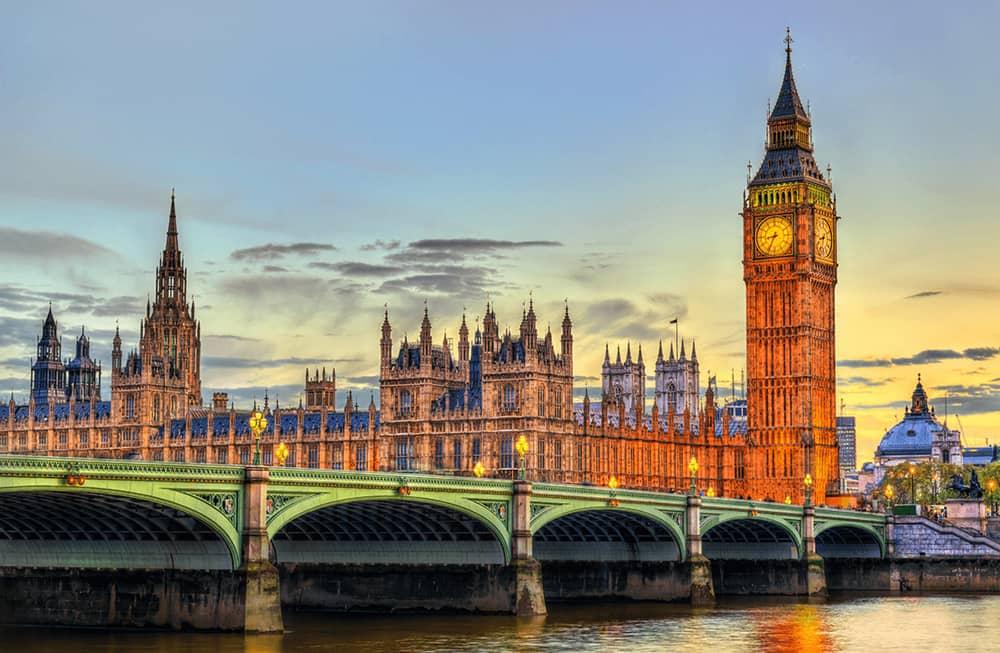The Advantages and Disadvantages of Living in the United Kingdom
The United Kingdom, a nation where one feels as though they are walking through the pages of an ancient book, presents a unique blend of tradition and modernity. From the grand palaces and cobbled streets of London to the lush green fields and historic castles of Scotland, the UK has long been a captivating destination for immigrants worldwide.
However, like any significant life transition, migrating to the UK comes with its own set of advantages and drawbacks. This article delves into a comprehensive analysis of the benefits and challenges of residing in the United Kingdom.

The Advantages of Living in the United Kingdom
The United Kingdom is a nation renowned for its rich history and culture, offering a myriad of attractions for both residents and visitors alike. From opulent palaces and historic castles to world-famous museums and art galleries, there is something to suit every taste in Britain.
Moreover, the UK boasts a robust economy and a dynamic job market. It is home to a wide range of global companies and organizations, providing diverse employment opportunities across numerous sectors.
Another significant advantage of living in the UK is the high quality of life. The country possesses an advanced healthcare system, an excellent education system, and modern infrastructure. Additionally, it ranks among the world’s safest and most politically stable nations.
Given these factors, the United Kingdom can be an ideal choice for those seeking to migrate and experience a high-quality lifestyle in a country with a rich culture, diverse job opportunities, and a high standard of living.

Golden Job Opportunities in the United Kingdom
The United Kingdom, a pioneer of the Industrial Revolution and a global leader in science and economics, offers a vast and dynamic job market for professionals worldwide. From the bustling streets of London, the world's financial center, to the industrial cities of northern England, a diverse range of opportunities awaits skilled workers and specialists.
A Vibrant and Diversified Economy:
- Global Financial Hub: London, as the world's financial capital, is home to major financial institutions and multinational corporations seeking top talent in banking, insurance, investment, and fintech.
- Innovation and Technology: Recognized as Europe's innovation and technology hub, the UK leads in fields such as artificial intelligence, robotics, and biotechnology. This creates attractive job prospects for experts in these domains.
- Entrepreneurship and Creativity: The UK fosters a strong entrepreneurial culture and supports innovative ideas. This has led to the growth of small and medium-sized enterprises and created job opportunities across various sectors.
In-Demand Skills:
The UK government actively seeks skilled workers in professions such as engineering, medicine, nursing, and education.
A Flexible Job Market
The UK employs a points-based immigration system that assesses individuals based on their skills and qualifications, providing opportunities for qualified professionals from around the world to work in the country.
Numerous internship and apprenticeship programs exist in the UK, offering job seekers the chance to gain practical experience and enhance their skills in real-world work environments.
Labor laws in the UK protect workers' rights, such as minimum wage, sick leave, and paid vacation.
By providing diverse job opportunities within a dynamic economy and a flexible labor market, the United Kingdom offers an ideal destination for skilled workers and professionals from around the globe. With dedication, perseverance, and the acquisition of necessary skills, one can achieve success in this country.

UK Education System
England is renowned for possessing one of the most prestigious and high-quality education systems globally. From small, state-funded primary schools in rural areas to world-renowned universities like Oxford and Cambridge, the country provides an exceptional environment for learning and nurturing talent at all levels of education.
A Deep-Rooted and Dynamic System:
- A Long Tradition of Education: With a history of education spanning over a millennium, England benefits from a rich heritage and an innovative approach to teaching and learning.
- Diversity of Educational Stages: UK education system encompasses a wide range of educational stages, including primary, secondary, college, and university, catering to the educational needs of students at various ages.
- Focus on Individual Skills: British schools place a strong emphasis on developing students' individual skills, creativity, and critical thinking abilities in addition to core subjects.
- Recognized Qualifications: Educational qualifications and certificates issued by UK educational institutions are highly regarded worldwide, assisting individuals in securing employment and pursuing further studies at top global universities.
Diverse Educational Opportunities
- Free State Schools: Education in state schools in England is free for children under 16.
- Private Schools: Private schools in England offer a diverse range of high-quality educational programs, making them an ideal choice for families seeking specialized education for their children.
- Prestigious Universities: England is home to some of the world's top universities, including Oxford, Cambridge, Imperial College London, and University College London, which offer programs in various fields of study.
- Scholarships: Numerous scholarships are offered by the UK government and universities to qualified international students.
Despite its numerous advantages, certain factors should be considered:
- High tuition fees at private schools: The tuition fees at private schools in England can be quite expensive.
- Competitive entry to top universities: Competition to gain admission to top universities in England, such as Oxford and Cambridge, is fierce.
- The need to learn English: Proficiency in the English language is essential for success within the English education system.
By offering a high-quality education system, a diverse range of academic programs, and numerous educational opportunities, studying in England provides an ideal environment for learning and developing one's potential on a global scale. With dedication, perseverance, and proper planning, one can take advantage of this education system and achieve their academic goals.

Healthcare Services in the United Kingdom
Access to quality healthcare is a fundamental human right, and the United Kingdom, through its National Health Service (NHS), provides one of the most comprehensive and respected healthcare systems in the world. This service guarantees this right to all citizens and residents.
NHS: A Guarantee of Health
- Free healthcare: Unlike many other countries, healthcare services in the NHS are provided free of charge to all individuals residing in the UK, regardless of citizenship, immigration status, or refugee status.
- Comprehensive coverage: The NHS offers a wide range of healthcare services, including medical check-ups, doctor's visits, surgery, medication, and hospital stays, all at no cost to the patient.
- High quality: The NHS boasts a team of experienced and skilled surgeons, doctors, and nurses, and provides services utilizing the latest treatment methods and advanced equipment.
- Easy access: The NHS has an extensive network of hospitals, health centers, and doctors throughout the UK, making healthcare services accessible to everyone.
Benefits Beyond Treatment
- Peace of mind: Knowing that you have access to quality, free healthcare when you need it provides a sense of security and peace of mind.
- Focus on prevention: In addition to providing treatment services, the NHS also focuses on disease prevention programs to help people live healthier lives and reduce the need for healthcare.
- Health equity: By providing free services to all people, the NHS strives to ensure that no one is denied access to healthcare due to financial difficulties.
By offering the National Health Service (NHS) as one of the most significant benefits of living in the country, the United Kingdom ensures the health and well-being of all its people. Despite facing some challenges, the NHS plays a crucial role in creating a healthy and equitable society.

Safety in the United Kingdom
In a world facing numerous security challenges, the United Kingdom stands out as a safe and secure nation with low crime rates. From the bustling streets of London to the tranquil villages of Scotland, one can live with peace of mind, enjoying the safety and security of themselves and their families.
Safety at the Heart of Society:
- Low crime rates: The UK is generally a safe country with low crime rates, particularly when compared to other developed nations.
- Efficient policing: The UK police force is recognized as one of the best in the world, ensuring public safety through dedication and expertise.
- Robust judicial system: The UK's judicial system is founded on justice and the rule of law, and it deals with crime decisively.
- Support for crime victims: Victim support is highly valued in the UK, with numerous organizations providing assistance to victims of crime.
Security Beyond the Streets
Cybersecurity: The British government is committed to safeguarding the cybersecurity of its citizens through proactive measures and advanced technologies.
Food Safety: The United Kingdom maintains high standards of food safety, with the quality of food products subject to ongoing monitoring by relevant agencies.
Environmental Security: The British government places a strong emphasis on environmental protection, implementing a range of measures to reduce pollution and create a healthy living environment.
Despite its high level of security, certain considerations should be kept in mind:
- Petty Crimes: As in any other country, minor offenses such as pickpocketing or theft may occur in the United Kingdom.
- Terrorist Threats: Like other European countries, the United Kingdom is not immune to terrorist threats.
- Civil Liberties: In recent years, there have been concerns regarding a decline in civil liberties in the United Kingdom.
By offering a high level of security in any areas such as personal safety, cybersecurity, food safety, and the environment, the United Kingdom provides a safe and peaceful environment for you to live in. By taking preventive measures and increasing your awareness, you can protect yourself and your family in this country.

Multicultural Society in UK
England, a country with a rich history and diverse cultural heritage, is an ideal place to experience various cultures and customs from around the world. From the bustling neighborhoods of London with people from different nationalities to the traditional villages of Scotland, preserving their traditional culture, England offers a unique opportunity to learn about different cultures and languages.
Benefits of Living in a Multicultural Society:
Living in a multicultural society can broaden one's perspective and foster a deeper understanding of diverse cultures and customs. Proficiency in multiple languages and familiarity with various cultural norms can enhance one's career prospects. Moreover, experiencing different cultures and cuisines can enrich one's life and lead to a greater appreciation for diversity. Finally, multicultural environments offer ample opportunities to forge new friendships with people from a wide range of backgrounds.

UK Transportation System
The United Kingdom boasts a sophisticated and modern transportation network, offering extensive and efficient rail, road, metro, and bus services to facilitate swift and convenient travel across the country.
Public Transportation Systems:
- Rail: The United Kingdom's railway network is one of the most extensive and well-organized in Europe, connecting major cities. Rail travel in Britain is comfortable, fast, and often scenic.
- Metro: London and several other major cities in the UK have metro systems, ideal for navigating within urban areas.
- Bus: Buses are readily available throughout the United Kingdom, providing transportation to cities, towns, and remote areas.
- Travel Cards: Various travel cards are available in the UK, allowing for cost-effective journeys.
Benefits of Using Public Transportation
- Reduced Pollution: Utilizing public transportation contributes to decreased air and environmental pollution.
- Stress Reduction: Commuting in crowded cities can be stressful, but using public transportation allows for a more relaxed journey.
- Cost Savings: Public transportation can lead to significant cost savings, especially by eliminating the need to purchase and maintain a personal vehicle.
- Increased Accessibility: Public transportation provides access to a wider range of destinations that may not be easily reached by private car.
Driving in the United Kingdom
- Driving Regulations: Driving regulations in the United Kingdom differ from those in many other countries, as left-hand traffic is mandatory.
- Road Network: The road network in the United Kingdom is well-constructed and maintained, although traffic congestion can occur in certain areas.
- Driving Costs: The cost of driving in the United Kingdom can be substantial, particularly when considering toll roads and parking fees.

Nature of England
England, a land renowned for its picturesque landscapes and rich biodiversity, is a haven for nature enthusiasts. From dramatic cliffs and sandy beaches to rolling hills and ancient woodlands, the country offers an unparalleled experience for every taste.
- Mountains: England is home to the highest peak in the British Isles, Ben Nevis in Scotland. The country's mountains provide ideal opportunities for hiking, climbing, and other outdoor pursuits.
- National Parks: With 15 national parks, England offers a stunning variety of landscapes. From the Lake District with its glacial lakes and towering peaks to the Yorkshire Dales with its rolling hills and lush valleys, these parks provide breathtaking scenery.
- Coastline: With over 12,000 kilometers of coastline, England boasts a diverse range of beaches. From the golden sands of the south to the rugged cliffs of the west, visitors can enjoy swimming, sunbathing, surfing, or simply strolling along the shore.
- Forests: Approximately 13% of England is covered in forests. These woodlands are home to a diverse range of wildlife, including deer, rabbits, foxes, and birds. England's forests offer excellent opportunities for walking, cycling, and camping.
Biodiversity
Despite its relatively small size, England boasts a rich biodiversity. The country is home to over 50,000 animal species and 2,000 plant species. Notable animals in England include red deer, sea otters, and peregrine falcons.
Environmental Conservation
England has a long history of environmental conservation. The country's first national park, the Lake District National Park, was established in 1951. Since then, the British government has undertaken numerous initiatives to protect the country's natural landscapes and wildlife.
With its diverse natural landscapes, rich biodiversity, and commitment to environmental conservation, England presents an ideal location for those seeking a life immersed in nature.

Disadvantages of living in England
despite its numerous advantages, living in England also presents certain challenges. One of the most significant is the high cost of living. Housing, particularly in major cities like London, can be prohibitively expensive.
Additionally, England's weather can be variable and unpredictable, characterized by frequent rainfall and overcast skies.
Furthermore, the unique culture and customs of England may pose difficulties for some individuals to adapt to. Finally, securing suitable employment in England, especially for foreigners, can be challenging due to high competition and employers' preference for candidates with specific skills and experience.
Given these drawbacks, it is essential to carefully consider all factors and conduct thorough research before making the decision to relocate to England.

The Cost of Living in England
The cost of living in England, particularly in metropolitan areas, is significantly higher than the global average. Housing, transportation, food, and other necessities can all be quite expensive.
Housing:
- Rent: The average monthly rent for a two-bedroom apartment in central London can exceed £2,000. Rental costs in other cities can also be substantial, especially in desirable neighborhoods or areas with good public transportation access.
- Purchase: Property prices in England are notoriously high. For instance, the average house price in London is well over £500,000.
Transportation and Food Costs in England
Transportation
- Public Transport: Public transportation costs in England, especially in London, can be substantial. A single metro ticket in London can cost up to £5.
- Fuel: Gasoline prices in England are also relatively high. On average, a liter of gasoline costs around £1.70.
Food
- Groceries: The cost of groceries in England is comparable to other Western European countries. However, dining out at restaurants can be more expensive.
- Dining Out: A meal at a casual restaurant in London can cost approximately £15.
While the cost of living in England can be high, careful budgeting and financial planning can help individuals manage their expenses and enjoy their time in this beautiful country.

UK weather
England is renowned for its variable and unpredictable weather. Situated in the mid-latitudes of the Northern Hemisphere, the country is influenced by oceanic air masses originating from the Atlantic Ocean.
These air masses can bring a wide range of weather conditions, including rain, wind, fog, cloud, and occasionally snow. England is a relatively wet country, with an average annual rainfall of around 1,100 millimeters. Rainfall is distributed fairly evenly throughout the year, although it is generally higher in winter than in summer. In certain regions, such as Scotland, annual rainfall can exceed 2,000 millimeters.
Wind is also a common feature of the British climate. The prevailing wind direction is from the southwest. Wind speeds can be considerable, especially in coastal areas. Fog is a frequent occurrence in England, particularly during the winter months. Fog can significantly reduce visibility and disrupt transportation.
Impacts of the Climate:
England's variable climate can be unpleasant for some, especially those accustomed to warmer climates.
- Heavy rainfall can lead to flooding and landslides.
- Strong winds can cause damage to property.
- Fog can disrupt transportation.
If you are considering moving to England, it is essential to factor in the country's climate before making a decision.

Food in England
Traditional British cuisine, once criticized for its simplicity and lack of variety, has undergone a significant transformation in recent years. High-quality restaurants offering modern British and international dishes are on the rise. However, finding food to suit specific tastes, especially for those accustomed to spicy or highly seasoned cuisine, can still be challenging.
Traditional Dishes:
Some classic British dishes include:
- fish and chips
- Sunday roast
- shepherd's pie
- bangers and mash
- full English breakfast
Modern Cuisine: In recent years, the British culinary scene has witnessed the emergence of creative and innovative chefs who are reimagining British cuisine using fresh, local ingredients. These restaurants offer a wide range of dishes inspired by traditional fare but adapted to modern palates.
International Cuisine: As a global metropolis, London boasts a vast array of international restaurants. In the city, one can find cuisines from all corners of the world, including Italian, Chinese, Indian, Thai, and Mexican.
Challenges for Specific Palates
Individuals accustomed to spicy or highly seasoned cuisine may find it challenging to find suitable food options in England. Traditional British dishes are generally relatively plain and lack complex flavors. However, in large cities like London, there is a growing number of restaurants offering spicy and flavorful international cuisine. While the British culinary scene has made significant strides in recent years, catering to a wider range of tastes, finding food to suit specific palates, especially for those who prefer spicy or highly seasoned dishes, can still be a challenge.

Challenges for Non-Native English Speakers in English Literature
England boasts a rich and long-standing literary tradition, having produced some of the world's most celebrated authors. From William Shakespeare and Jane Austen to Charles Dickens and Virginia Woolf, English writers have created enduring works admired globally. However, for non-native English speakers seeking to appreciate English literature, several challenges may arise.
- Language: The primary challenge is the language itself. English is a complex language with an extensive vocabulary and grammar. Comprehending English literary works fully, especially for those whose first language is not English, can be demanding.
- Culture: The second challenge lies in the cultural context. English literature often alludes to English culture and history. A foundational understanding of these subjects is essential for a comprehensive appreciation of English literary works.
- Accessibility: The third challenge is accessibility. Some English literary works may not have been translated into other languages, or their translated versions may not be readily available.
English literature is rich and diverse, and it can be a source of great pleasure and enlightenment for people worldwide. Despite the challenges faced by non-native English speakers, there are ways to overcome these obstacles and enjoy this literary treasure trove.

Summary
England is a country with a rich culture, a proud history, and a diverse society. It offers numerous job opportunities, an excellent education system, and a high quality of life. However, living in England also has its drawbacks, including a high cost of living, variable weather, and a unique culture. Ultimately, whether England is the right place to live for you depends on your individual priorities and circumstances. If you are seeking a country with a rich culture, diverse job opportunities, and a high quality of life, England may be a suitable choice. However, it is important to carefully weigh all factors and conduct thorough research before immigrating to this country, to be prepared for potential challenges.
For more information on immigrating to England, please contact the PenStudents Institute.